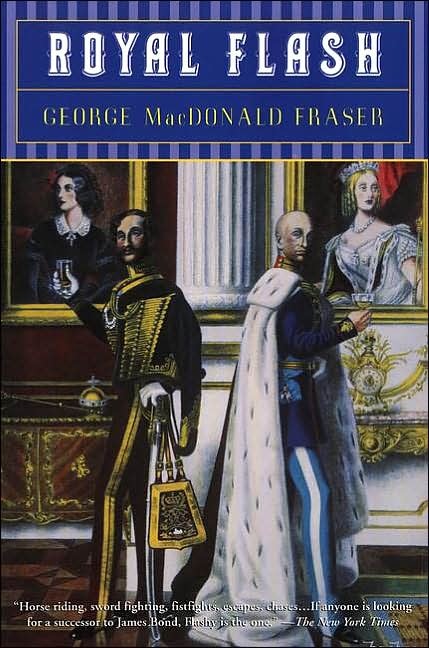If I read The Prisoner of Zenda when I was ten, I read the Flashman books when I was fourteen or so, and re-read them when new ones came out until one day I suddenly noticed that they’d been visited by the sexism fairy and stopped enjoying them. Royal Flash is the second of them, and one of the weaker ones. It really is The Prisoner of Zenda redone with sex, and with a dishonourable coward in the hero role. I can understand the urge to do this, but I find Royal Flash mean-spirited and, unforgivably, much less funny than the original.
The conceit here is that Bismark noticed that Flashman is the double of a Danish prince, except for the prince being bald, and coerces him into a complicated exchange plot. As always with Fraser, real historical figures are woven into the narrative—in this case Lola Montez as well as Bismark.
The two men are identical, once Flashman is shaved and given the prince’s dueling scars. There’s no reason given, it’s just one of those coincidental double things—which makes it oddly much less plausible than The Prisoner of Zenda. The conceit is that Flashman told the story to Hope (Hawkins, which was Hope’s real name) and he made it into the bestseller version. This therefore follows Hope quite closely—it’s set in an imaginary German principality, the dungeon is the same, some of the characters have the same names and so on.
Like all the Flashman books, it’s full of sex—and where Rudolf is so honourably chastely Victorian, Flashman takes any and every opportunity to get any woman into bed. The marriage with the princess bothered me a lot, because the sex is so non-consensual, and what bothers me most is that I don’t think I noticed it was non-consensual when I read it as a teenager. Potentially triggering spoilers: The fact that she doesn’t want him is seen by him as a good thing, he rapes her and she likes it. Yuck.
My problem with Flashman is that he’s not just a rogue, he really is despicable. Fraser knew this, at least with the early books. I think Fraser fell in love with his own creation later and softened him. But here he is despicable, a coward and a bully and a toady and a rapist and a thief, telling the story in his own words and from a perspective much later in his life. I think you’re supposed to find it sexy and funny and clever, and I just find it clever and somewhat repellant. This probably wasn’t the best one to re-read now, because I never really liked it, but I wouldn’t have been reading it at all if not for the double identity thing.
As George MacDonald Fraser is on the one hand dead (so his feelings can’t be hurt) and on the other a huge bestseller (so his sales cannot be hurt by anything I say) I think I can reasonably say that I disliked this book and do not recommend it. I did keep reading it though, even not liking it, as Fraser’s readability and ability to spin a story remains as high as ever.
And that’s it for double identity for the time being.
Jo Walton is a science fiction and fantasy writer. She’s published eight novels, most recently Half a Crown and Lifelode, and two poetry collections. She reads a lot, and blogs about it here regularly. She comes from Wales but lives in Montreal where the food and books are more varied.










